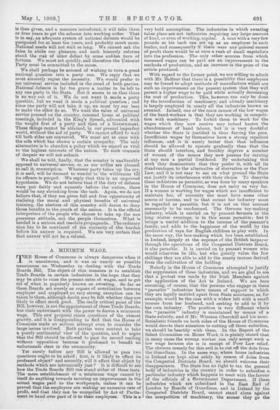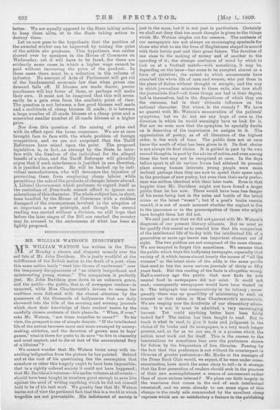A MINIMUM WAGE. T HE House of Commons is always dangerous
-when it is unanimous, and it was as nearly as possible unanimous on Wednesday in dealing with the Trade Boards Bill. The object of this measure is to establish Trade Boards in certain industries in the hope that they may be able to raise the present rates of wages, and to get rid of what is popularly known as sweating, So far as these Boards act merely as organs of conciliation between employer and employed no very strong exception can be taken to them, although doubt may be felt whether they are likely to effect much good. The really critical point of the Bill, however, is not the appointment of these Trade Boards, but their endowment with the power to decree a minimum wage. This new proposal raises questions of the utmost gravity, and it is disappointing to find that the House of Commons made no serums attempt even to consider the large issues involved. Both parties were content to take a purely sentimental view of the question, and to argue that the Bill should be allowed to pass its second reading without opposition because it professed to benefit an unfortunate class in the community.
Yet surely before any Bill is allowed to pass two questions ought to be asked ; first, is it likely to effect its professed object!' and secondly, will it effect that object by methods which are intrinsically just ? It is difficult to see how the Trade Boards Bill can stand either of these tests. The mere establishment of a minimum wage cannot by itself do anything towards secering an improvement in the actual wages paid to the workpeople, unless it can be proved that the employers are making an excessive rate of profit, and that they Can be • compelled by Act of Parlia- ment to baud over part of it to their employees, This is a very bold assumption. The industries in which sweating takes place are not industries requiring any large amount of fixed, or even of working, capital. A man with a very few pounds at his back can set up as an employer in such trades, and consequently if there were any general excess of profit there would be at once a rush of small capitalists into the profession. The only other sources from which increased wages can be paid are an improvement in the methods of production, and an increase in the price of the article produced.
With regard to the former point, we are willing to admit with Mr. Balfour that there is a possibility that employers may be forced to adopt methods of manufacture which are such an improvement on the present system that they will permit a higher wage to be paid while actually decreasing the cost of production. This, however, can only be done by the introduction of machinery, and already machinery is largely employed in nearly all the industries known as sweated. Indeed, one of the main causes of the low wages of the hand-workers is that they are working in competi- tion with machinery. To forbid them to work for the wages which they now receive may indeed hasten the abandonment of hand labour, but it is very doubtful whether the State is justified in thus forcing the pace. Insufficient wages by themselves have a strong repellent influence, and it is surely better that that influence should be allowed to operate gradually than that the State should interfere, and. forcibly deprive a number of women of the means they now possess for earning at any rate a partial livelihood. By undertaking this work they demonstrate that they prefer it, with all its disadvantages, to the alternative of starvation or the Poor Law, and it is not easy to see on what ground the State can justify its interference with their choice. To describe these industries as parasitic, as was done by many speakers in the House of Commons, does not carry us very far. If a woman is working for wages which are insufficient to maintain her, of necessity she must have some other source of income, and to that extent her industry must be regarded as parasitic, but it is not on that account neeossarily to be condemned. The German toy-making industry, which is carried on by peasant farmers in the long winter evenings, is in this sense parasitic; but it brings a useful addition to the income of the peasant's family, and adds to the happiness of the world by the production of toys for English children to play with. In the same way, the lace-making which has been established in Ireland, largely at the expense of the British taxpayer through the operations of the Congested Districts Board, is also parasitic. It is carried on by peasant women who would otherwise be idle, but who greatly value the few shillings they are able to add to the scanty income derived from the cultivation of the holding.
Nobody in the House of Commons attempted to justify the suppression of these industries, and we are glad to see that a protest was made by the Irish Members against the application of the Act to Ireland. We are here assuming, Of course, that the persons who engage in these " parasitic " industries have means of support to which they are legally entitled apart from State assistance, as, for example, would be the ease with a widow left with a small income from her husband, and seeking to add to it by her own industry. The position is very different where the " paraeitio " industry is maintained by means of a State subsidy, and if Mr. Winston Churchill and his semi- Socialistic friends on both sides of the House of Commons would devote their attention to cutting off these subsidies, we should be heartily with them. In the Report of the Select Committee on Home Work it is plainly stated that in many cases the woman worker can only accept such a low wage because she is in receipt of Poor Law relief. The obvious remedy for this evil is to cut off the dole from the Guardians. In the same way, where home industries in Ireland are kept alive solely by means of doles from the Congested Districts Board, we should welcome their disappearance. The State has no right to tax the general body of industries in the country in order to subsidise a particular industry which happens to meet with the favour of the officials of a Government Department. If these industries which are subsidised in the East End of London by Boards of Guardians, and in Ireland by the Congested Districts Board, cannot stand alone against the competition of machinery, the sooner they go the better. We are equally opposed to the. State taking action to keep them alive, or to the State taking action to destroy them. Let us now pass to the hypothesis that the position of the sweated worker can be improved by raisieg the price of the article she produces. This hypothesis was rather shirred over by speakers in the House of Commons on Wednesday, yet it will have to be faced, for there are evidently some cases in which a higher wage cannot be paid without increasing the price of the product. In these cases there must be a reduction in the volume of industry. " No amount of Acts of Parliament will get rid of the fundamental economic law that when prices rise demand falls off. If blouses are made dearer, poorer purchasers will buy fewer of them, or perhaps will make their own. It must not be imagined that this will neces- sarily be a gain even from the aesthetic point of view; The question is not between a few good blouses well made and a multitude of cheap blouses ill ,made ; it is between a. large number of ill-made blouses at a cheap price and a somewhat smaller number of ill-made blouses at a higher price. Nor does this question of the raising of price end with its effect upon the home consumer. We are at once brought face to face with the whole problem of foreign competition, and we axe not surprised that the Tariff Reformers have seized upon the point. The proposed legislation is, in fact, an attempt by the State to inter- fere with the freedom of the individual for the alleged benefit of a class, and the Tariff Reformer will plausibly argue that if such interference is justified in one direction, it is justified in another. He will be backed up by indi- vidual manufacturers, who will denounce the injustice of preventing them from employing cheap labour while permitting the sale of the products of cheaper labour abroad. A Liberal Government which professes to regard itself as the custodian of Free-trade cannot afford to ignore con- siderations of this character. The whole subject has, in short, been handled by the House of Commons with a reckless disregard of the consequences involved in the adoption of so important a new prieciple, and though the second reading was carried without a division, we still hope that before the later stages of the Bill are reached the country may be aroused to the seriousness of what has been so lightly proposed.











































 Previous page
Previous page